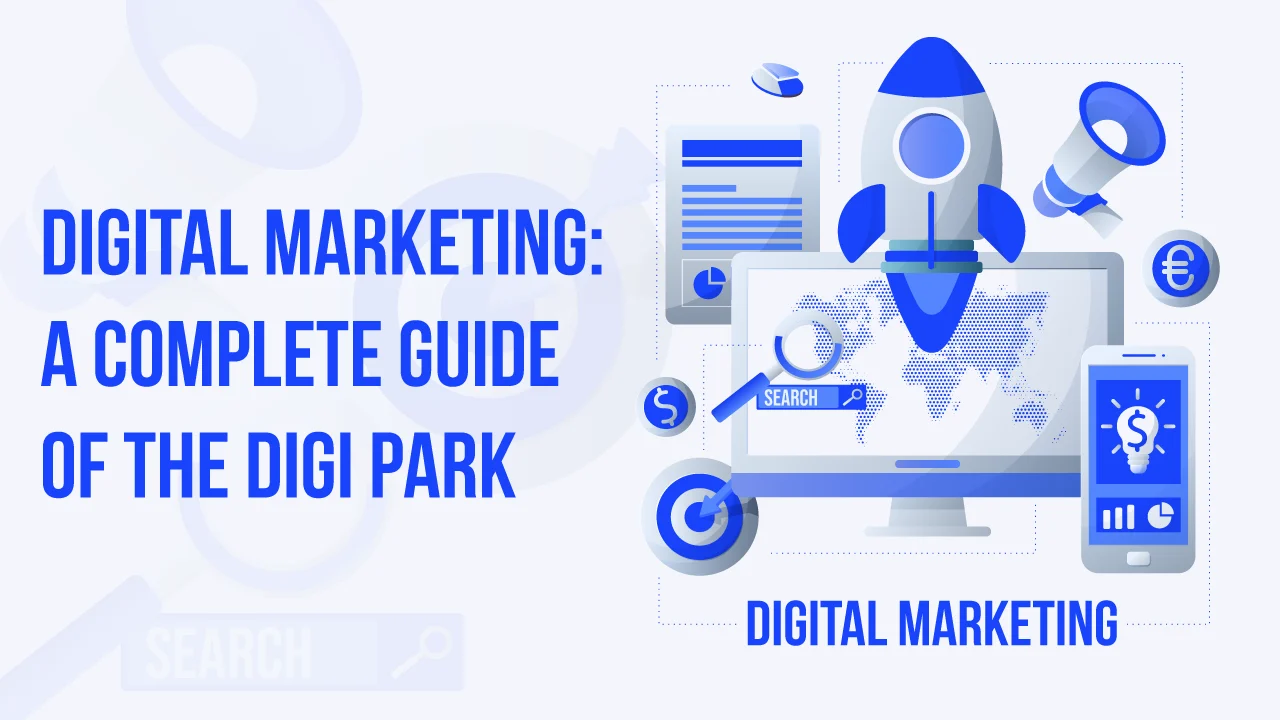Digital marketing has transformed the way businesses interact with their customers. Understanding digital marketing is critical for any organization trying to prosper online in today’s rapidly evolving digital market. So, what exactly is digital marketing? Simply simply, it refers to all marketing operations that involve the internet or an electronic device. This includes social media campaigns, SEO, email marketing, and online advertising.
Digital marketing services are vital for businesses looking to boost their online presence and drive growth. Why is this important? Because digital marketing enables you to target specific audiences, track campaign efficacy, and adapt plans in real time. This implies you can make data-driven decisions that provide better outcomes.
Key Performance Indicators (KPIs) are must in measuring the success of your digital marketing efforts. These metrics help you understand how well your strategies are performing and where improvements can be made. Whether you’re working with a full-service online marketing agency or handling marketing in-house, tracking KPIs ensures that your marketing investments are delivering value.
The Major Components of Digital Marketing
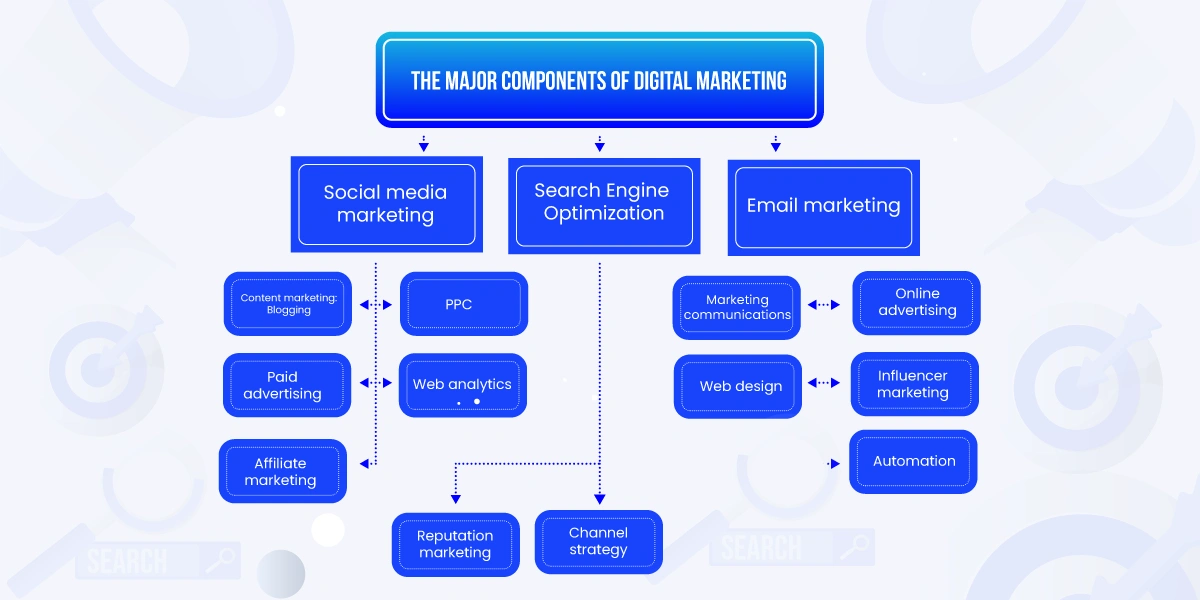
Social media marketing
Social media marketing is a dynamic subset of digital marketing that leverages social media platforms to connect with your target audience, build brand awareness, drive website traffic, and ultimately, boost sales. Unlike traditional marketing, SMM allows for direct interaction with customers, fostering relationships and loyalty.
By crafting engaging content, participating in conversations, and utilizing data analytics, businesses can effectively reach and influence their desired demographic. Whether it’s building a strong brand identity, generating leads, or increasing customer satisfaction, social media marketing offers unparalleled opportunities for growth in today’s digital landscape.
Search engine optimization
Search Engine Optimization (SEO) is the way of optimizing your website to rank higher in search engine results pages (SERPs). When users search for products or services related to your business, SEO ensures that your website appears prominently, increasing visibility and attracting potential customers.
Effective SEO involves a combination of technical, content, and authority-building strategies. By understanding search engine algorithms, conducting keyword research, creating high-quality content, building backlinks, and optimizing website structure, you can significantly enhance your website’s organic search rankings.
A well-executed SEO strategy drives organic traffic, improves user experience, and establishes your business as a trusted authority in your industry.
Email marketing
Email marketing is a powerful digital marketing strategy that involves sending targeted messages to a subscribed audience. By building and nurturing relationships with potential and existing customers, businesses can effectively promote products, services, and brand loyalty.
This cost-effective channel allows for personalized communication, enabling marketers to deliver relevant content, exclusive offers, and timely updates. With careful segmentation and automation, email campaigns can be optimized to achieve specific goals, such as lead generation, customer retention, and sales conversions.
To succeed in email marketing, it’s essential to prioritize deliverability, engagement, and data analysis. By crafting compelling subject lines, designing visually appealing emails, and tracking key metrics, businesses can maximize the return on investment of their email campaigns.
Content marketing: Blogging
Blogging is a cornerstone of content marketing, involving the creation and publication of regular articles on a specific topic. By sharing valuable insights, stories, and information, businesses can attract and engage their target audience, establish thought leadership, and drive website traffic.
Through consistent blogging, you can build a loyal following, improve search engine rankings, generate leads, and foster customer relationships. By aligning your blog content with your overall business objectives, you can position your brand as a trusted authority in your industry.
Effective blogging requires a strategic approach, including keyword research, compelling storytelling, and optimization for search engines. When done right, blogging can be a powerful tool for achieving your marketing goals.
PPC
Pay-Per-Click (PPC) is a form of online advertising where advertisers pay a fee each time one of their ads is clicked. This model allows businesses to quickly reach their target audience and drive immediate traffic to their website.
PPC campaigns are typically run on search engines like Google Ads and Bing Ads, as well as social media platforms such as Facebook, Instagram, and LinkedIn. By bidding on relevant keywords and creating compelling ad copy, businesses can secure prominent placement in search results and news feeds.
The effectiveness of PPC campaigns can be measured through key performance indicators (KPIs) like click-through rates, conversion rates, and return on investment (ROI). Continuous optimization and A/B testing are essential for maximizing the performance of PPC campaigns and achieving desired business objectives.
Paid advertising
Paid advertising is a marketing strategy where businesses pay to display their ads to a targeted audience on various digital platforms. It’s a powerful tool for generating immediate visibility, driving traffic, and achieving specific marketing goals.
Compared to organic methods like SEO and content marketing, paid advertising offers faster results, allowing businesses to reach their desired audience quickly and effectively. By carefully selecting advertising platforms, crafting compelling ad copy, and optimizing bids, marketers can maximize the return on investment (ROI) of their paid campaigns.
Web analytics
Web analytics is the measurement, collection, analysis, and reporting of web data to understand and optimize web usage. It’s the process of gathering insights about website visitors, their behavior, and interactions to make data-driven decisions for improvement.
By tracking key metrics like website traffic, bounce rate, conversion rates, and user engagement, businesses can gain valuable insights into website performance. These insights can be used to enhance user experience, improve website design, optimize marketing campaigns, and ultimately drive business growth.
Web analytics tools provide detailed reports and visualizations that help identify trends, patterns, and opportunities for optimization. By understanding your audience and how they interact with your website, you can make informed decisions to increase conversions, boost sales, and build customer loyalty.
Affiliate marketing
Affiliate marketing is a performance-based marketing strategy where businesses reward affiliates for each visitor or customer brought by the affiliate’s own marketing efforts. Affiliates, typically individuals or other businesses, promote a company’s products or services in exchange for a commission on sales generated from their referrals.
This mutually beneficial partnership allows businesses to expand their reach without investing heavily in advertising, while affiliates can earn income by promoting products they believe in. By utilizing affiliate links and tracking customer journeys, both parties can measure the effectiveness of their campaigns and optimize strategies accordingly.
Affiliate marketing has become increasingly popular due to its scalability, cost-effectiveness, and ability to leverage the influence of affiliate marketers.
Marketing communications
Marketing communication is the strategic process of conveying a consistent message about a brand or product to a target audience through various channels. It involves carefully selecting and coordinating marketing tools, channels, and messages to achieve specific communication objectives.
This multifaceted discipline encompasses a wide range of activities, including advertising, public relations, sales promotions, direct marketing, personal selling, digital marketing, and event marketing. By effectively integrating these elements, businesses can build strong brand awareness, create desire, and ultimately drive customer action.
The goal of marketing communication is to establish a meaningful connection with the target audience, fostering trust, loyalty, and advocacy. By understanding the customer journey and tailoring messages accordingly, businesses can create compelling narratives that resonate with consumers and position their brand as a preferred choice.
Online advertising
Online advertising is the practice of using the internet to deliver promotional, interactive, and measurable ads to consumers. It involves a strategic approach to displaying ads on websites, search engines, social media platforms, and other digital channels to reach a target audience.
Unlike traditional advertising, online advertising offers greater precision in targeting specific demographics, interests, and behaviors. This allows businesses to deliver highly relevant messages to potential customers, increasing the likelihood of engagement and conversions.
Web design
Web design is crucial in digital marketing as it shapes user experience and impacts brand perception. A well-designed site captures attention, builds trust, and encourages engagement. It ensures that visitors can navigate easily, find information quickly, and have a seamless experience across devices, boosting both retention and conversion rates. Mobile responsiveness is essential, as it affects both user satisfaction and search engine rankings. Additionally, incorporating SEO best practices into web design—such as optimizing page speed, using clean code, and strategically placing keywords—improves visibility in search results. Overall, effective web design enhances user experience, supports SEO efforts, and drives conversions, making it a key component of any successful digital marketing strategy.
Influencer marketing
Influencer marketing is a strategic partnership between brands and individuals who have a significant social following and influence over their audience. By collaborating with influencers, businesses can effectively reach and engage their target market, build brand awareness, and drive sales.
Influencers act as trusted advocates for brands, sharing their experiences and recommendations with their followers. This authentic endorsement can significantly impact consumer behavior, as people tend to rely on recommendations from individuals they admire or relate to.
Key benefits of influencer marketing include increased brand visibility, enhanced credibility, expanded reach, and higher engagement rates. By carefully selecting influencers who align with brand values and target audience, businesses can maximize the impact of their campaigns and achieve measurable results.
Automation
Automation refers to the use of technology to perform tasks without human intervention. In the realm of marketing and business operations, automation is a powerful tool for increasing efficiency, productivity, and scalability.
By automating repetitive tasks, businesses can free up human resources to focus on strategic initiatives, improve accuracy, and reduce errors. Automation also enables data-driven decision-making by providing valuable insights through analytics and reporting.
Reputation marketing
Reputation marketing is the strategic process of identifying, creating, and amplifying positive brand content to enhance a company’s online reputation. It involves proactively managing and promoting a favorable image of a business or brand.
By focusing on positive customer experiences, testimonials, and reviews, reputation marketing helps build trust, credibility, and loyalty among consumers. It involves monitoring online conversations, responding to feedback, and leveraging positive content to attract new customers and retain existing ones.
Reputation marketing is closely tied to public relations, social media marketing, and customer service. It’s about turning satisfied customers into brand advocates who can influence potential customers’ purchasing decisions.
Channel strategy
Channel strategy involves planning and managing the various routes through which products or services are distributed to customers. It encompasses the selection, management, and optimization of distribution channels to ensure that your offerings reach the target market effectively and efficiently. A well-crafted channel strategy aligns with your overall business goals, maximizes reach, and enhances customer experience.
The Importance of Digital Marketing Services
Digital marketing services are crucial for business success in the online world. By utilizing comprehensive digital marketing strategies, businesses enhance their visibility, engage effectively with their target audience, and drive growth.
Key services like search engine optimization (SEO) and social media marketing improve online presence and expand reach. These strategies enable precise audience targeting through tools like pay-per-click (PPC) advertising, maximizing ROI. Data-driven insights from analytics help refine and optimize marketing efforts.
Additionally, comprehensive digital marketing strategies build brand reputation, foster customer loyalty, and facilitate global reach. Leveraging these services ensures that businesses remain competitive, adaptable, and effective in a rapidly evolving digital landscape.
Why You Need to Track Your KPIs
Tracking KPIs is essential for business success. They offer a clear picture of performance, helping identify strengths, weaknesses, and areas for improvement. By setting specific goals and measuring progress, businesses can make informed decisions, optimize strategies, and allocate resources effectively. KPIs also enhance accountability, foster a data-driven culture, and ultimately drive growth.
The Most Important Digital Marketing KPIs
- General Marketing KPIs
- Search Engine Optimization (SEO) KPIs
- Social media KPIs
- Paid advertising (PPC) KPIs
- Email marketing KPIs
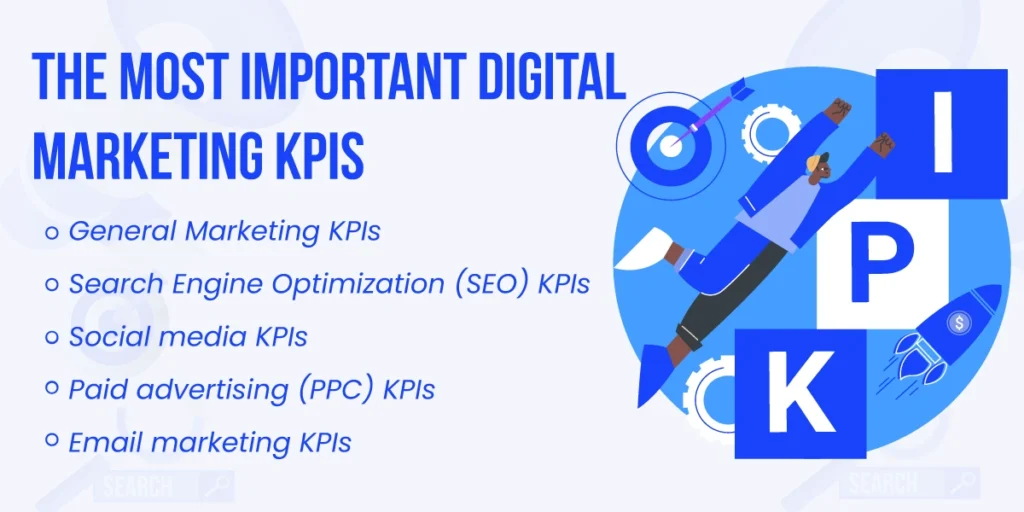
General Marketing KPIs
General marketing Key Performance Indicators (KPIs) are crucial metrics used to evaluate the effectiveness of marketing strategies and campaigns. These indicators help businesses measure success, identify areas for improvement, and make data-driven decisions to optimize their marketing efforts. Here are some key general marketing KPIs:
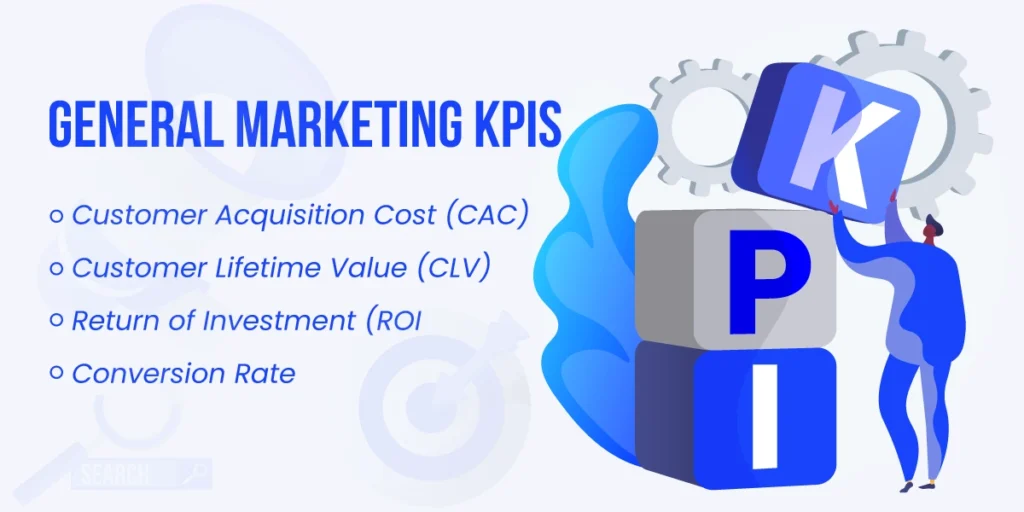
- Customer Acquisition Cost (CAC): Measures the total cost of acquiring a new customer, including marketing and sales expenses. It helps assess the efficiency of your marketing spend in generating new customers.
- Customer Lifetime Value (CLV): Represents the total revenue a business can expect from a customer throughout their relationship with the company. This KPI helps determine the long-term value of customers and the effectiveness of retention strategies.
- Return of Investment (ROI): Calculates the revenue generated from marketing activities relative to the cost of those activities. It helps evaluate the profitability of marketing campaigns and overall marketing effectiveness.
- Conversion Rate: The percentage of website visitors or leads that complete a desired action, such as making a purchase or signing up for a newsletter. It measures the effectiveness of your marketing efforts in converting prospects into customers.
Search Engine Optimization (SEO) KPIs
Tracking Key Performance Indicators (KPIs) for Search Engine Optimization (SEO) is crucial for evaluating the effectiveness of your SEO efforts and understanding how well your website is performing in search engine results. Here are some essential SEO KPIs to monitor:
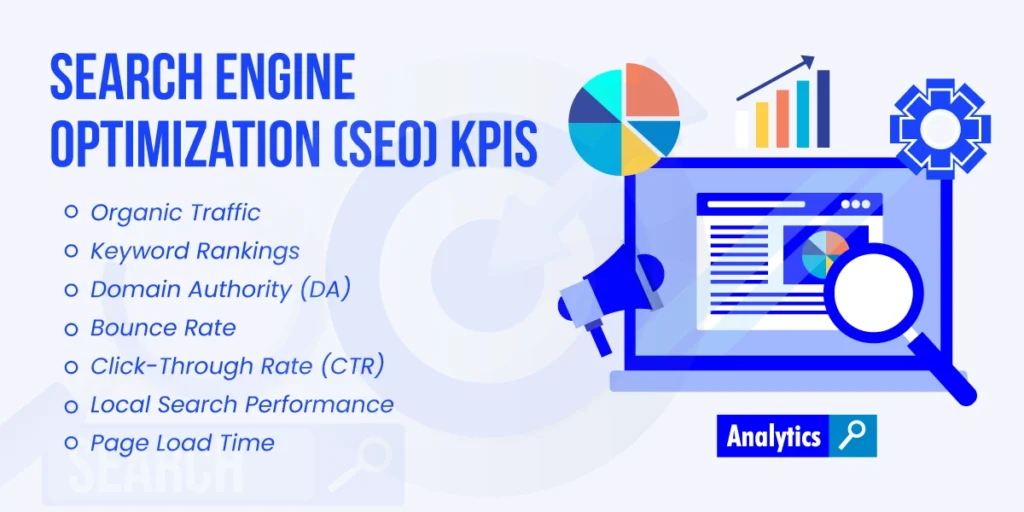
- Organic Traffic: Measures the number of visitors who arrive at your website through unpaid search engine results. This KPI helps assess the overall effectiveness of your SEO strategy in driving traffic.
- Keyword Rankings: Tracks the position of your targeted keywords in search engine results pages (SERPs). Monitoring keyword rankings helps evaluate the success of your keyword optimization efforts.
- Domain Authority (DA): A score that predicts how well a website will rank on search engines. Higher DA indicates stronger site authority and better potential for higher rankings.
- Bounce Rate: The percentage of visitors who leave your website after viewing only one page. A high bounce rate may indicate issues with user experience or content relevance, affecting SEO performance.
- Click-Through Rate (CTR): The percentage of users who click on your website’s link after seeing it in search engine results. A higher CTR indicates that your meta titles and descriptions are compelling and relevant.
- Local Search Performance: For businesses with a local focus, monitoring rankings and traffic from local searches can provide insights into how well you’re performing in local SEO.
- Page Load Time: The amount of time it takes for a web page to fully load. Faster page load times enhance user experience and can positively impact search engine rankings.
Social Media KPIs
Tracking Key Performance Indicators (KPIs) for social media is essential for understanding the impact and effectiveness of your social media efforts. These KPIs help measure engagement, reach, and overall performance, allowing you to optimize your social media strategy. Here are some crucial social media KPIs to monitor:
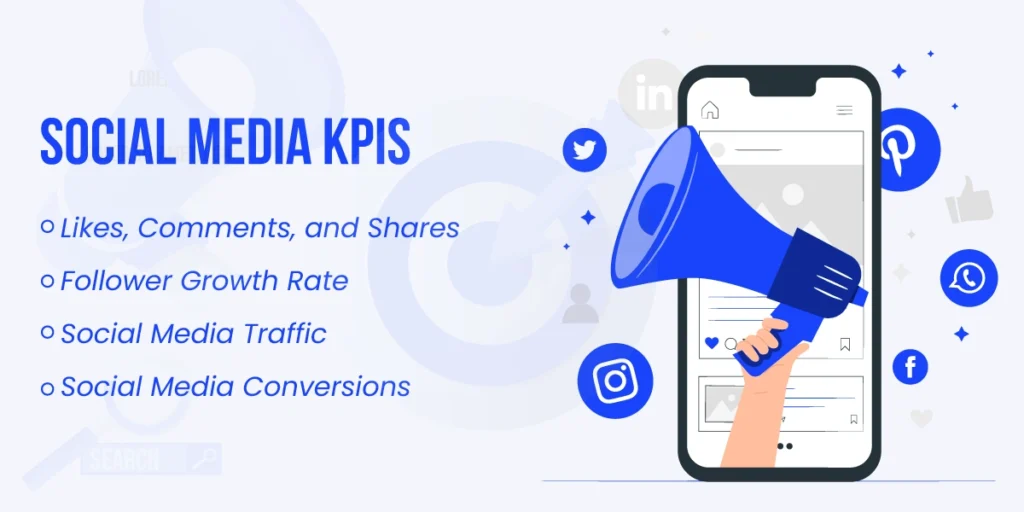
- Likes, Comments, and Shares: Measures the level of interaction your content receives, including likes, comments, shares, and other forms of engagement relative to your total followers or impressions. A higher engagement rate indicates that your content resonates well with your audience.
- Follower Growth Rate: Tracks the increase or decrease in the number of followers over time. This KPI helps assess the effectiveness of your social media campaigns in attracting new followers and growing your audience.
- Social Media Traffic: Measures the total number of unique users who see your social media posts. Tracking reach provides insight into how widely your content is distributed and how effectively it is reaching your target audience.
- Social Media Conversions: Measures the percentage of social media visitors who complete a desired action, such as making a purchase or signing up for a newsletter. This KPI helps assess how effectively your social media efforts drive valuable actions.
Paid Search Marketing KPIs
Paid search marketing, or pay-per-click (PPC) advertising, is a powerful tool for driving targeted traffic to your website. To measure the effectiveness of your PPC campaigns, it’s crucial to track several key performance indicators (KPIs). Here’s a detailed look at the most important KPIs for paid search marketing:
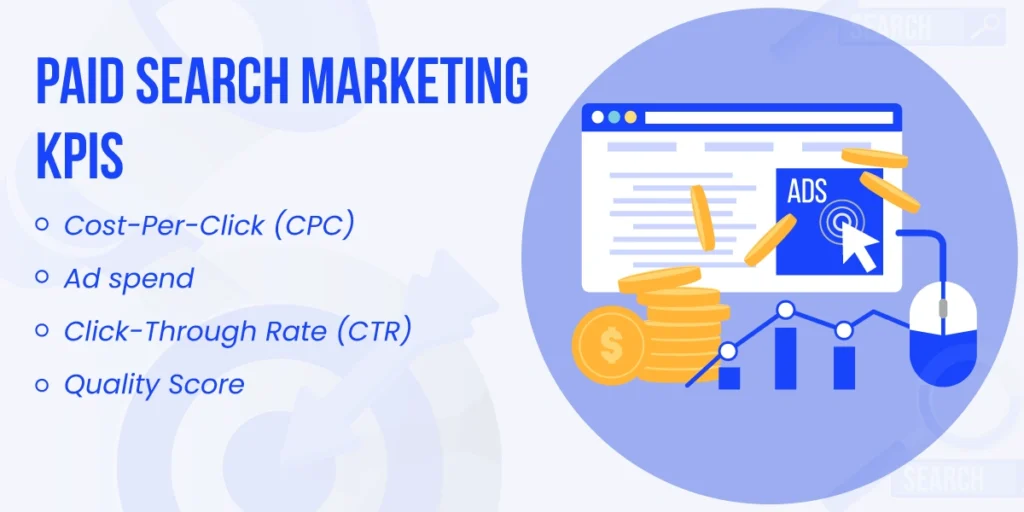
- Cost-Per-Click (CPC): Cost-Per-Click (CPC) is a fundamental metric in paid search marketing. It measures the amount you pay each time a user clicks on your ad. CPC is essential for evaluating the efficiency of your bidding strategy and the cost-effectiveness of your campaigns. Lower CPCs are generally desirable, as they indicate you are paying less for each click while still reaching your target audience. To optimize CPC, you might need to refine your ad targeting, improve your ad relevance, or adjust your bidding strategy.
- Ad spend: Ad spend refers to the total amount of money allocated and used for your paid advertising campaigns. Monitoring ad spend helps you manage your budget effectively and assess whether your spending is aligned with your marketing goals. It’s important to track ad spend in conjunction with other KPIs to ensure that your budget is yielding a positive return on investment (ROI). By analyzing ad spend, you can make informed decisions about scaling up or down your campaigns based on their performance.
- Click-Through Rate (CTR): Click-Through Rate (CTR) measures the percentage of people who click on your ad after seeing it. It’s calculated by dividing the number of clicks by the number of times the ad is shown (impressions) and then multiplying by 100 to get a percentage. A higher CTR indicates that your ad is compelling and relevant to users. Improving CTR can involve optimizing your ad copy, using engaging visuals, and ensuring that your keywords are aligned with your target audience’s search intent.
- Quality Score: Quality Score is a metric used by search engines, such as Google, to evaluate the relevance and quality of your ads, keywords, and landing pages. It’s based on a scale from 1 to 10, with higher scores reflecting better performance. Quality Score impacts your ad placement and cost-per-click. A high Quality Score can lead to better ad positions and lower CPC, while a low score may result in higher costs and lower ad visibility. To improve your Quality Score, focus on creating relevant ads, optimizing your landing pages for user experience, and ensuring that your keywords are closely related to your ad content.
Email Marketing KPIs
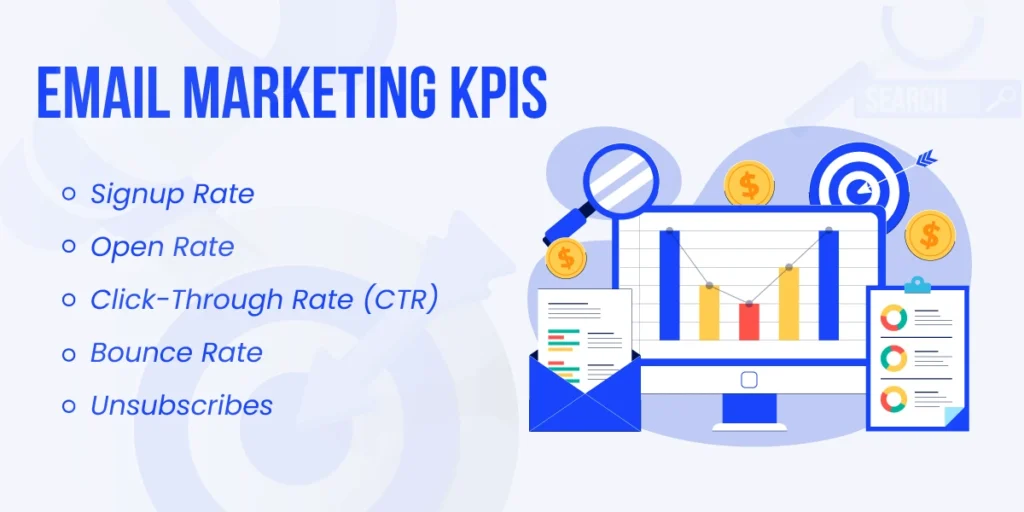
Tracking Key Performance Indicators (KPIs) for email marketing is crucial for evaluating the success of your campaigns and optimizing your strategy. Here are some key email marketing KPIs to monitor:
- Signup Rate: It measures the percentage of visitors who subscribe to your email list compared to the total number of visitors to your site. A higher signup rate indicates effective lead capture strategies and the appeal of your email offers or incentives.
- Open Rate: It tracks the percentage of recipients who open your email out of the total number of emails delivered. This KPI helps gauge the effectiveness of your subject lines and the relevance of your email content to your audience.
- Click-Through Rate (CTR): It represents the percentage of recipients who click on a link within your email. A higher CTR indicates that your email content, calls to action, and overall message are engaging and persuasive.
- Bounce Rate: It measures the percentage of emails that cannot be delivered to recipients’ inboxes, either due to invalid email addresses or technical issues. Monitoring bounce rate helps maintain a clean email list and improves deliverability.
- Unsubscribes: It tracks the number of recipients who opt out of your email list after receiving a campaign. A high unsubscribe rate may signal issues with email content, frequency, or relevancy, and provides insight into areas for improvement.
The Digi Park – Best Digital Marketing Company
When it comes to digital marketing, The Digi Park stands out as a premier choice. Known for its innovative strategies and comprehensive solutions, The Digi Park is often recognized as one of the best digital marketing companies. Their team of experts excels in providing customized digital marketing solutions that cater to the unique needs of each business.

Why The Digi Park is the Best in Bangladesh
The Digi Park combines deep industry knowledge with cutting-edge technology to deliver exceptional results. Whether you’re looking for affordable digital marketing services or a full-service online marketing agency, The Digi Park offers tailored strategies that align with your business goals.
Leading Digital Marketing Experts
The team at The Digi Park includes some of the most trusted digital marketing experts in the industry. Their expertise spans across various digital marketing components, ensuring a holistic approach to your marketing needs.

Top-Rated Digital Marketing Companies
As one of the top-rated digital marketing companies, The Digi Park has earned a reputation for excellence through successful client campaigns and innovative solutions. Their commitment to delivering measurable results sets them apart in the digital marketing landscape.
Digital marketing is an essential component of modern business strategy. From understanding its various elements to tracking important KPIs, mastering digital marketing can significantly impact your business’s success. By leveraging the expertise of top digital marketing companies like The Digi Park, you can implement effective strategies that drive growth and achieve your business objectives.
To stay ahead in the modern digital age, you must have a thorough understanding of digital marketing methods and constantly optimize your strategies. Whether you’re working on SEO, social media, or email marketing, keeping an eye on KPIs and modifying your strategy based on data is critical to success online.

